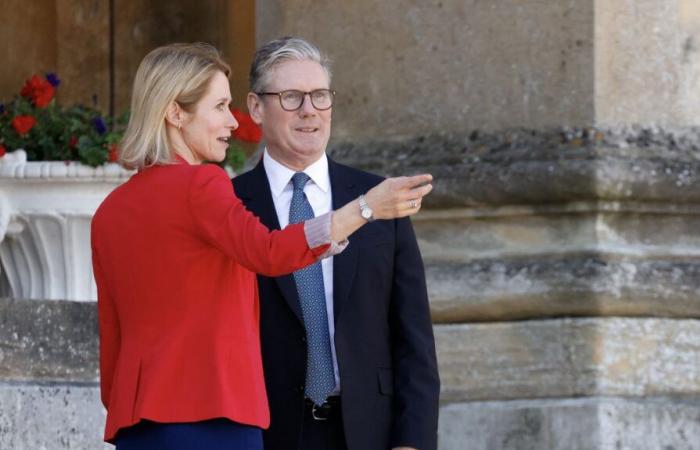The hearings of European commissioners begin on Monday November 4 at the European Parliament. Among them, a significant number of personalities from Central Europe. A new mark of interest for these countries, which can be explained by the geopolitical context.
Since February 24, 2022, the date of Russia's invasion of Ukraine, the European Union has been listening more to the small countries of Central Europe. For years, these states have denounced Russia's policy of aggression, without finding any response in the Western world.
Now the situation has changed. This is evidenced by the positions of European commissioners allocated by the President of the European Commission Ursula von der Leyen to these small countries. The three Baltic countries thus won the prize, with Foreign Affairs, Defense and Economy.
Estonian Kaja Kallas, High Representative of the Union for Foreign Affairs and Security Policy
Kaja Kallas aimed for NATO, she got foreign affairs within the European executive. An economist and lawyer – she studied European law – this 47-year-old woman is a member of the Estonian Reform Party (ERE), a liberal party, which belongs to the Renew group in Brussels.
Prime Minister of her country from 2021 to July 2024, Kaja Kallas is also the daughter of Siim Kallas, Prime Minister, President of the Central Bank of Estonia and European Commissioner between 2000 and 2014. Nicknamed in Estonia “the Iron Lady”, Kaja Kallas does not have harsh enough words against Russia and its President Vladimir Putin. Moreover, Russia launched a wanted notice against her last February. But for the new head of European diplomacy, as for the majority of Estonians, we must not give in an inch to Moscow.
A vision shared by all the nations of Central Europe, with the exception of Orban's Hungary and Fico's Slovakia, two populist and pro-Putin regimes. The EU's foreign policy has undergone a 180-degree turnaround. Forgot her realpolitikBrussels entrusts the reins of its diplomacy to a declared opponent of Russian power. What a change!
Lithuanian Andrius Kubilius, Commissioner for Defense and Space
Andrius Kubilius, 67, was a physicist and researcher at Vilnius University during the USSR. During the collapse of the Soviet Union in the late 1980s and early 1990s, Kubilius was an important member of the Lithuanian dissident movement. He then joined the Fatherland Union-Lithuanian Christian Democrats (TS-LKS), a party very close to the German CDU, the party of Ursula von der Leyen.
Andrius Kubilius was Prime Minister of his country twice, in 2000 and between 2008 and 2012. And like Kaja Kallas, his goal is clear: to rearm Europe to counter the Russian threat. He, who was an active member of the Foreign Affairs Committee of the European Parliament, knows the importance of European defense. Andrius Kubilius thus wishes to fight against chronic shortages of ammunition and equipment in European armies. He will work closely with Kaja Kallas. With one imperative: that the responsibilities between the two portfolios are clearly demarcated. The planned budgets are enormous. Ursula von der Leyen thus mentioned the figure of 500 billion euros over ten years to strengthen Europe's defense.
Latvian Valdis Dombrovskis, Commissioner for Economy and Productivity
At 53, Valdis Dombrovskis has an eclectic career: a physicist but also an economics graduate from the University of Riga, he worked at the Central Bank of Latvia. This liberal, from the center-right Unity party, was Prime Minister from 2009 to 2014 before occupying several positions as European Commissioner.
This economist is close to those called “frugal states”, the countries of Central and Northern Europe attached to budgetary orthodoxy. In 2009, then head of government, he had a draconian budgetary austerity plan adopted, marked in particular by a 20% reduction in civil service salaries and a 10% reduction in retirement pensions. However, this will not harm him, he will serve three successive mandates.
In Brussels, he therefore logically has the reputation of being a budgetary orthodox. Executive Vice-President of the European Commission and Commissioner in charge of trade in the outgoing team, he was tasked by Ursula von der Leyen with managing the economy and productivity portfolios during the next term. In recent months, he has been particularly concerned with the issue of surcharges on imports of Chinese electric vehicles.
In his new role, he will notably be in charge of financing the investments of member countries, in a context of planned extinction of the EU's common borrowing program “NextGenerationEU”, endowed with more than 800 billion euros.
Slovenian Marta Kos, Commissioner for European Enlargement
Marta Kos, aged 59, began her career in the pools since she was a swimming champion, under the Yugoslav flag. She then worked as a journalist, first in her country, Slovenia, then in Germany as a correspondent for Slovenian television. She then held diplomatic positions: ambassador of Slovenia to Germany, Latvia and Switzerland.
Marta Kos also had a brief career within a political party. From April to September 2022, she was one of the vice-presidents of the Freedom Movement, a liberal and ecological center-left party, member of the Renew group in the European Parliament.
For her first experience within an executive, Marta Kos will be responsible for the strategic enlargement file. “This is the absolute priority of my new mandate,” declared the President of the European Commission on October 23 during a tour of the Western Balkans. Five Balkan countries have official candidate status: North Macedonia, Bosnia-Herzegovina, Serbia and Montenegro. Georgia, Moldova and Ukraine, for their part, recently saw their candidate statuses validated by Brussels.
Marta Kos' objective will be to work for the progressive integration of these countries, in particular by helping them to accomplish the reforms necessary for accession. The political will is there even if the road remains long. Questioned by AFP, Lukas Macek, head of the Greater Europe Center at the Jacques Delors Institute, estimated that there would be no “no full membership possible before the end of the Commission's mandate” in 2030.






